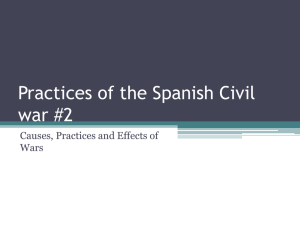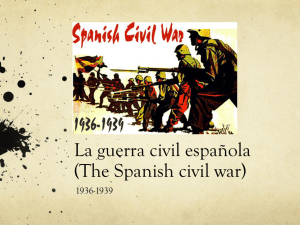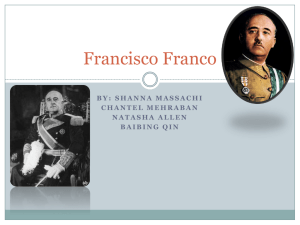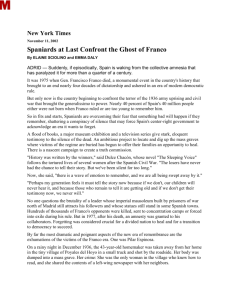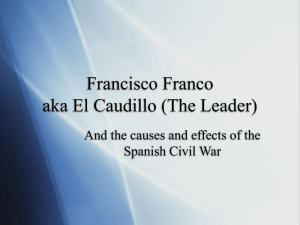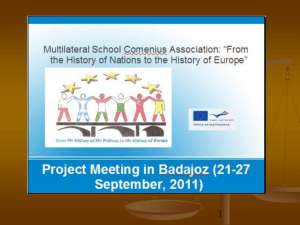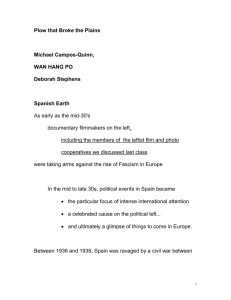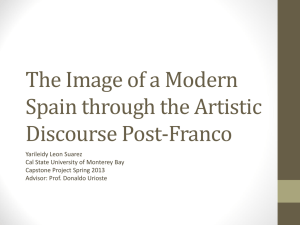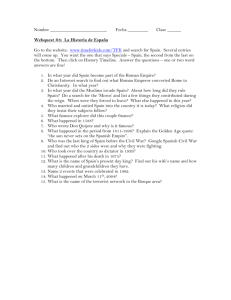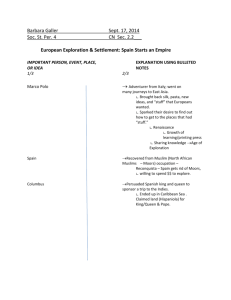Franco PowerPoint
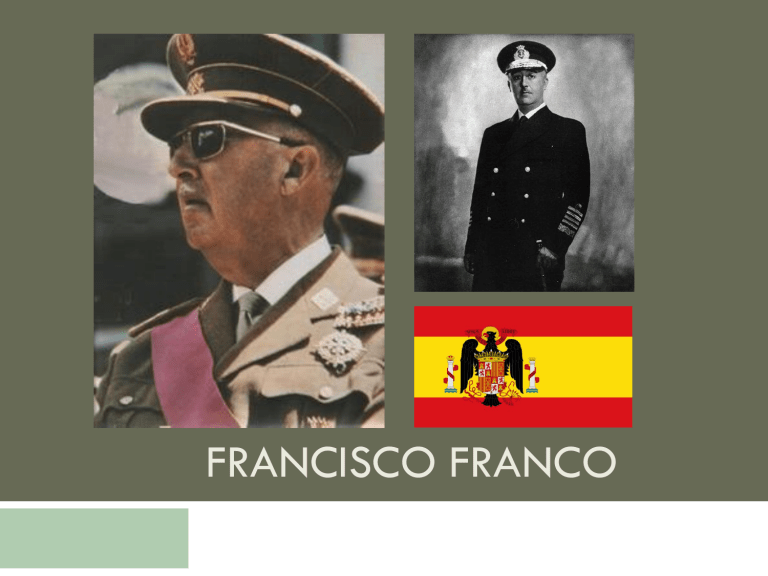
FRANCISCO FRANCO
Spain Before Franco
President
Niceto Alcala Zamora
The Second Spanish Republic had been voted in with a majority in 1931
Foreign exchange and deportation of goods ruined by depression and civil war
Nation ’ s support was split between aristocracy and republic
Governmental position switched from right wing (1933) to left (1936)
Depression left the economy in pieces, forcing citizens to suffer with a poor quality of life
Spain Before Franco Continued…
Spain was not given the option of having a dictator
Spain questioned if President
Alcala Zamora was becoming too radical and so the government shifted left
Franco rejected principles of liberalism such as individualism, rights and freedoms, and competition
Bringing Franco Into Power
Franco was upset with the idea of a coalition government
Used the death of parliamentary leader José
Calvo Sotel as a pretext for a civil war
Rebellion was planned ahead of
Calvo ’ s death
With the aid of Italy and Nazi
Germany Franco ’ s fascist military won
Under Franco ’ s
Rule
Civil war lasted from 1936 – 1939.
600, 000 Spaniards killed & 1 000 000 sent to concentration camps.
Only legal party under Franco's post civil war regime was the Falange Española
Tradicionalista y de las JONS, formed in
1937
Ruled 1937-1975
Government was an authoritarian dictatorship beginning in 1939
Franco ’ s Rule Continued…
Franco ’ s fascist military received help from Italy and
Nazi Germany during civil war
Franco allowed Italy and
Germany to bomb Spanish
Basque country side as a threat towards Britain and
France
In return Hitler expected aid from Spain in WWII
Franco rapidly industrialized
Spain with the steel industry
Franco’s Rule Continued…
He outlawed anything that did not agree with catholic beliefs
Franco even went as far as outlawing any other language than Spanish and took away all rights given to the autonomous regions of Spain.
At this time the church and state of
Spain were one body and it was the responsibility of both to enforce the change towards unity.
Isolation was a concept that was key in Franco’s Spain.
The End of Franco
Franco’s rule came to an end on
November 20 th , 1975 when he died due to heart failure
Rule lasted nearly four decades
Francisco's successor Juan Carlos came into power and converted the government into a democratic constitutional monarchy
The End of Franco Continued…
Juan Carlos became king of Spain and named Arias Navarro as Prime Minister
Anti-Francoists were extremely upset in the initial months of the monarchy, and demonstrations, industrial strikes, and terrorist activity challenged the country's stability.
Arias Navarro’s government cautiously brought in reforms, which were quickly rejected by Orthodox Francoists, who resisted any form of change.
Current Spain
Spain currently has the highest EU unemployment rate (20%) and is roughly
$90 billion in debt
Sovereignty issues with land off the coast of Morocco
Drug trafficking of heroine, cocaine and hashish
Franco’s Evaluation
Franco had good intentions through unity, but went too far by trying to cut out cultural diversity within Spain
Franco took power through force, and created the
Civil War which resulted in the loss of many civilian lives
Spain’s Condition
Spain is in a much better state nationally now than when
Franco was in power
Now Spain’s citizens have freedom of self expression, private property, and are able to compete within the economy
Under Franco’s rule people lived with oppression and fear of being an individual outside of the collective church
Bibliography
Franco's Spain. Web. 14 Nov. 2010. <http://lindsey45220.tripod.com/>.
Answers.com - How Did Francisco Franco Come to Power." WikiAnswers - The Q&A Wiki. Web.
14 Nov. 2010. http://wiki.answers.com/Q/How_did_Francisco_Franco_come_to_power
.Autumn, By. "Spain 1935: Some What-ifs about Alcala Zamora and the Straperlo Scandal."
Online Community for Discussing War History, Medieval Period, Ancient History, and
Archaeology. Web. 14 Nov. 2010. <http://www.historykb.com/Uwe/Forum.aspx/whatif/11825/Spain-1935-Some-what-ifs-about-Alcala-Zamora-and-the-Straperlo>.
"Spain-Transition to Democracy THE POST-FRANCO ERA." Rainforest - Mongabay.com. Web.
14 Nov. 2010. <http://www.mongabay.com/history/spain/spaintransition_to_democracy_the_post-franco_era.html>.
"Spain Economy - Flags, Maps, Economy, Geography, Climate, Natural Resources, Current
Issues, International Agreements,Population, Social Statistics, Political System." Photius
Coutsoukis; Photius; Photios; Fotis Koutsoukis - Sustained by Working Capital in the World. Web.
14 Nov. 2010. <http://www.photius.com/wfb1999/spain/spain_economy.html>.
"BBC News - Spain - Timeline." BBC News - Home. Web. 14 Nov. 2010.
<http://news.bbc.co.uk/2/hi/europe/country_profiles/992004.stm>.
